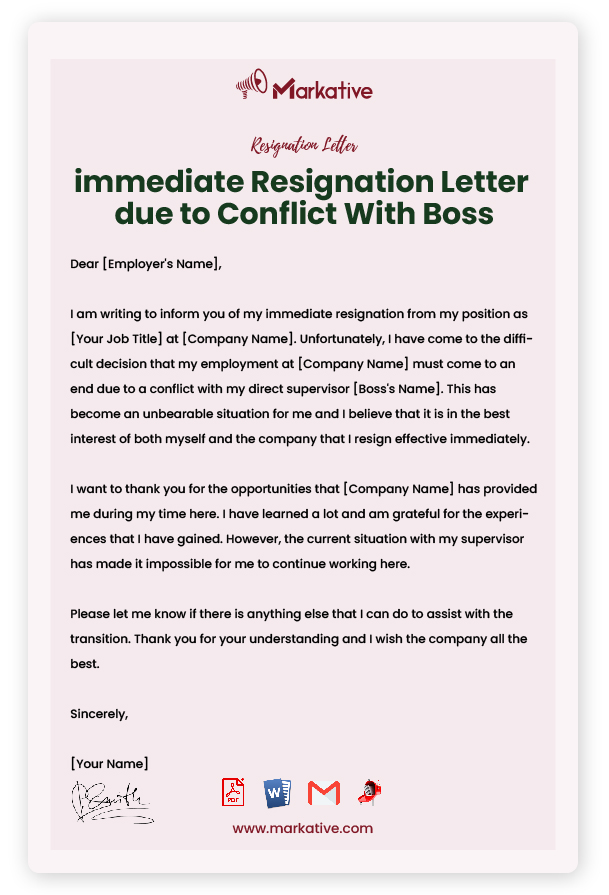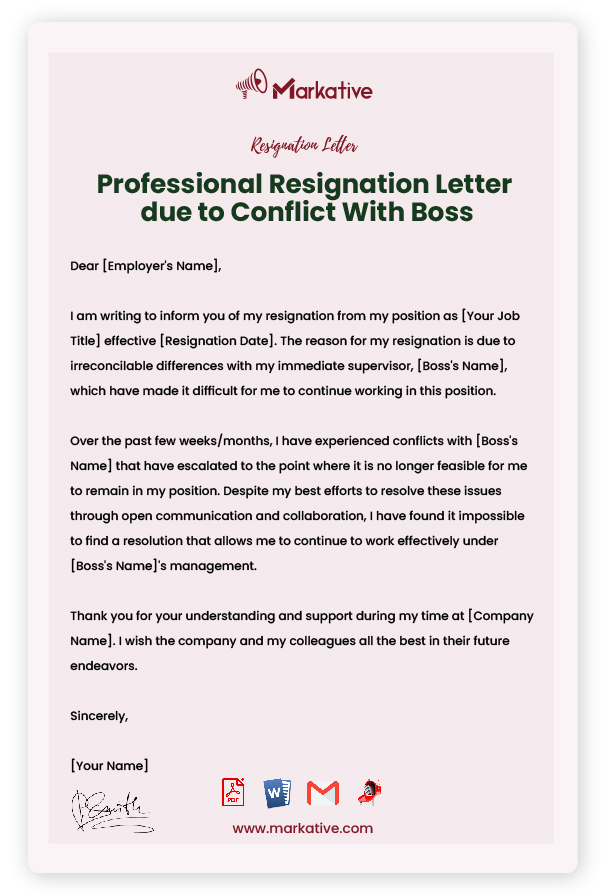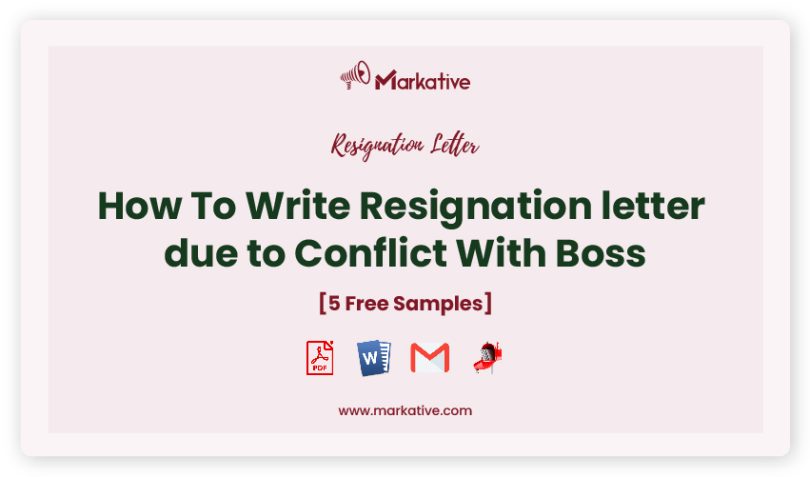A resignation letter is an essential part of the professional world. It serves as a formal announcement of an employee’s decision to leave their current position. Resignation letters are significant because they provide closure to the employer-employee relationship, and the company can start looking for a replacement. Moreover, a resignation letter also acts as evidence of your intentions and the reason behind your departure, which can be beneficial if there are any legal or professional disputes.
A well-written resignation letter can have a significant impact on both the employee and the employer. For the employee, it can help them leave the company with grace and professionalism, preserving their relationships with their colleagues and superiors. For the employer, it can demonstrate the employee’s commitment to the organization and leave a positive impression that could lead to future opportunities. A good resignation letter can also help the employer identify and address any issues that might be causing the employee’s departure, helping them improve their work environment for future employees.
Resigning from a job is never an easy decision, especially when it’s due to a conflict with your boss. However, it’s essential to handle the situation professionally, and a well-written resignation letter can make all the difference. In this article, we’ll explore the importance of resigning the right way, how a good Resignation Letter due to Conflict With Boss can create a positive impact, and provide tips on how to write a resignation letter that effectively communicates your reasons for leaving. Whether you’re leaving your job due to a conflict with your boss or any other reason, this article will provide you with the guidance you need to resign with confidence and professionalism.
How To Write Appealing Resignation Letter due to Conflict With Boss ?
Writing an appealing resignation letter due to conflict with your boss can be a challenging task. It requires careful consideration and a professional approach. Here are 5 steps to guide you in writing an effective letter.
- Be Clear and Concise: Your resignation letter should be clear and concise, stating your intention to resign and the reason for your decision. Avoid using emotional language or blaming your boss for the conflict.
Example: “I regret to inform you that I am resigning from my position effective two weeks from today. The reason for my resignation is due to a conflict with my immediate supervisor.”
- Express Gratitude: Show appreciation for the opportunity and experience gained while working with the company. Express your willingness to help with the transition process and offer to assist in any way possible.
Example: “I want to express my gratitude for the opportunity to work with this company. I appreciate the experience gained and the valuable lessons learned. I am willing to help with the transition process to ensure a smooth handover of my responsibilities.”
- Be Professional: Maintain a professional tone throughout the letter. Avoid being negative or critical of the company or your boss.
Example: “I have made this decision after careful consideration and believe it is in my best interest to move on. I hope that this resignation will not cause any inconvenience to the company.”
- Provide Notice: Provide adequate notice of your resignation to allow the company to make necessary arrangements. The standard notice period is two weeks, but it may vary depending on your contract.
Example: “My last day of work will be two weeks from today, and I will ensure that all my current responsibilities are handed over to my successor before leaving.”
- Proofread and Edit: Ensure that your resignation letter is error-free and well-structured. Proofread and edit your letter before submitting it to your boss.
Example: “Thank you for the support and guidance provided during my time with the company. I wish the company continued success and prosperity.”
Conclusion: Writing an appealing resignation letter due to conflict with your boss requires a professional and diplomatic approach. Follow these 5 steps to ensure that your letter is effective and well-received by your employer. Remember to express gratitude and maintain a positive tone throughout the letter.

Immediate Resignation Letter due to Conflict With Boss
[Your Name] [Your Address] [City, State ZIP Code] [Date] [Employer's Name] [Employer's Address] [City, State ZIP Code] Dear [Employer's Name], I am writing to inform you of my immediate resignation from my position as [Your Job Title] at [Company Name]. Unfortunately, I have come to the difficult decision that my employment at [Company Name] must come to an end due to a conflict with my direct supervisor [Boss's Name]. This has become an unbearable situation for me and I believe that it is in the best interest of both myself and the company that I resign effective immediately. I want to thank you for the opportunities that [Company Name] has provided me during my time here. I have learned a lot and am grateful for the experiences that I have gained. However, the current situation with my supervisor has made it impossible for me to continue working here. I will do everything within my power to ensure that my resignation is as smooth as possible. I will complete any outstanding work and provide any necessary documentation to ensure a smooth transition for my successor. Please let me know if there is anything else that I can do to assist with the transition. Thank you for your understanding and I wish the company all the best. Sincerely, [Your Name]
Sample Resignation Letter due to Conflict With Boss
Dear [Boss's Name], I am writing to inform you of my decision to resign from my position as [Your Position] at [Company Name]. This decision has not been an easy one for me, but recent conflicts between us have made it clear that it is the best course of action for both of us. I have enjoyed my time at [Company Name] and have learned a lot from working with you and the rest of the team. However, the ongoing conflict between us has made it difficult for me to continue in my role and has had a negative impact on my work and well-being. I want to thank you for the opportunities you have given me and the support you have provided during my time here. I will ensure a smooth transition during my remaining time at the company and will do everything possible to assist in finding and training my replacement. Please let me know how I can be of assistance during this process. I wish you and the company all the best for the future. Sincerely, [Your Name]
Professional Resignation Letter due to Conflict With Boss
[Your Name] [Your Address] [City, State ZIP Code] [Email Address] [Today's Date] [Employer's Name] [Employer's Address] [City, State ZIP Code] Dear [Employer's Name], I am writing to inform you of my resignation from my position as [Your Job Title] effective [Resignation Date]. The reason for my resignation is due to irreconcilable differences with my immediate supervisor, [Boss's Name], which have made it difficult for me to continue working in this position. Over the past few weeks/months, I have experienced conflicts with [Boss's Name] that have escalated to the point where it is no longer feasible for me to remain in my position. Despite my best efforts to resolve these issues through open communication and collaboration, I have found it impossible to find a resolution that allows me to continue to work effectively under [Boss's Name]'s management. I am grateful for the opportunities that [Company Name] has provided me, and I will always appreciate the skills and experiences I have gained during my time here. However, I believe it is in the best interest of both myself and the company for me to resign and seek other employment opportunities. Please let me know if there is anything I can do to help with the transition, including training a replacement or completing any outstanding projects before my departure. I am committed to making this process as smooth as possible for everyone involved. Thank you for your understanding and support during my time at [Company Name]. I wish the company and my colleagues all the best in their future endeavors. Sincerely, [Your Name]
Resignation Letter due to Conflict With Boss with Notice Period
[Your Name] [Your Address] [City, State ZIP Code] [Email Address] [Today’s Date] [Employer’s Name] [Company Name] [Address] [City, State ZIP Code] Dear [Employer’s Name], I am writing this letter to officially resign from my position as [Your Position] with [Company Name]. My resignation is due to the conflicts I have been experiencing with my immediate supervisor, [Boss’s Name]. My last day of work will be [Last Day of Work], which is the last day of my notice period of [Notice Period Length] days. I would like to express my appreciation for the opportunities provided to me during my time at [Company Name]. I have learned a great deal from my colleagues and have gained valuable experience that I will take with me as I pursue my career goals. Although I regret that my time at [Company Name] has come to an end, I have decided that it is in my best interest to seek other opportunities that are more in line with my personal and professional goals. I believe this decision is the best course of action for both myself and the company. I will do everything I can to ensure a smooth transition during the remainder of my time at [Company Name]. Please let me know if there is anything specific that I can do to help make the transition easier for the company. Thank you for your understanding and support during this time. I appreciate the opportunities and experiences I have had while working at [Company Name]. Sincerely, [Your Name]
Resignation Letter due to Conflict With Boss without Notice Period
Dear [Boss's Name], I am writing to inform you of my immediate resignation from my position as [Your Position] at [Company Name]. Unfortunately, due to recent conflicts and disagreements between us, I feel that it is in the best interest of both parties if I resign without serving a notice period. I understand that this decision may come as a surprise and inconvenience to you and the team, but I believe that it is necessary for my own well-being and to maintain a professional work environment. It is not my intention to cause any disruption or inconvenience to the company, and I assure you that I will do everything within my power to ensure a smooth transition of my duties. I would like to express my gratitude for the opportunities that you have given me during my time at [Company Name]. I have learned a great deal and developed many valuable skills, and I will always be grateful for the experiences that I have gained here. I wish you and the company all the best in the future and hope that my sudden resignation does not cause any significant inconvenience. Sincerely, [Your Name]
How Much Notice Should You Give for a Resignation Letter due to Conflict With Boss?
According to a 2021 survey by the job site Indeed, 51% of U.S. employees reported having quit their job due to a conflict with their boss or manager. This figure is up from 43% in a similar survey conducted in 2019. The survey also found that millennials and Gen Z employees are more likely to quit their job due to a boss conflict compared to older generations.
When resigning due to a conflict with your boss, it is recommended to give at least two weeks’ notice. This is a standard courtesy in most industries and provides enough time for the company to find a replacement or make other arrangements. However, if the situation is particularly volatile or if you fear for your safety, it may be necessary to give shorter notice or even resign immediately. It’s important to prioritize your own well-being and safety in such situations.

Is it Ok To Email a Resignation Letter due to Conflict With Boss?
It is generally acceptable to email a resignation letter due to a conflict with your boss. While it may be considered more professional to deliver the resignation in person, if the conflict has made your work environment intolerable or unsafe, it is understandable to want to resign via email. It is important to keep the tone of the email professional and avoid making any negative comments about your boss or colleagues. Here is an example:
Dear [Manager's Name], I am writing to inform you of my resignation from my position as [Job Title] effective [Date]. Unfortunately, due to a conflict with my immediate supervisor, I have decided that it is in my best interest to pursue other opportunities. I would like to take this opportunity to thank you and the company for the experience and knowledge gained during my time here. Please let me know if there is anything I can do to assist in the transition during my remaining time here. Sincerely, [Your Name]
Common Mistakes When Writing a Resignation Letter due to Conflict With Boss?
- Being too emotional: When writing a resignation letter due to conflict with your boss, it is important to keep your emotions in check. Avoid being too emotional or using inflammatory language, as this can make the situation worse and damage your professional reputation.
- Failing to provide enough detail: While you don’t want to be overly emotional, it’s also important to provide enough detail to explain why you are resigning. Be specific about the issues you’ve had with your boss and provide examples if possible. This can help prevent misunderstandings and ensure that your resignation is taken seriously.
- Burning bridges: Even if you are leaving due to a conflict with your boss, it’s important to maintain a professional demeanor in your resignation letter. Avoid making accusations or placing blame, and focus on the positive aspects of your time with the company. Remember that you may need a reference or want to return to the company in the future, so it’s important to leave on good terms.
Conclusion:
Resigning from a job due to a conflict with your boss can be a difficult decision, but it is sometimes necessary for your own well-being and career growth. When writing a resignation letter, it is important to be professional and courteous, while also clearly stating the reason for your resignation. It is also crucial to choose the right time and place to submit your resignation letter, such as during a private meeting with your boss or via email.
Some common mistakes to avoid include being too emotional, providing too much detail about the conflict, or being too negative about the company or your boss. To make the process easier, we have provided multiple free and ready-to-use templates that you can use as a guide when writing your resignation letter. Ultimately, the goal of a resignation letter is to leave a positive and professional impression, even as you move on to new opportunities.







